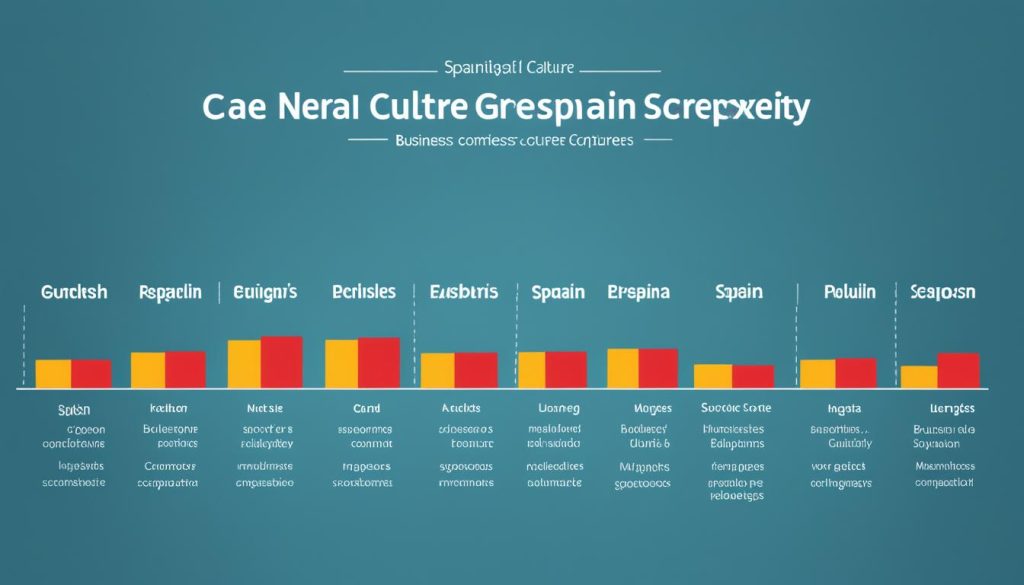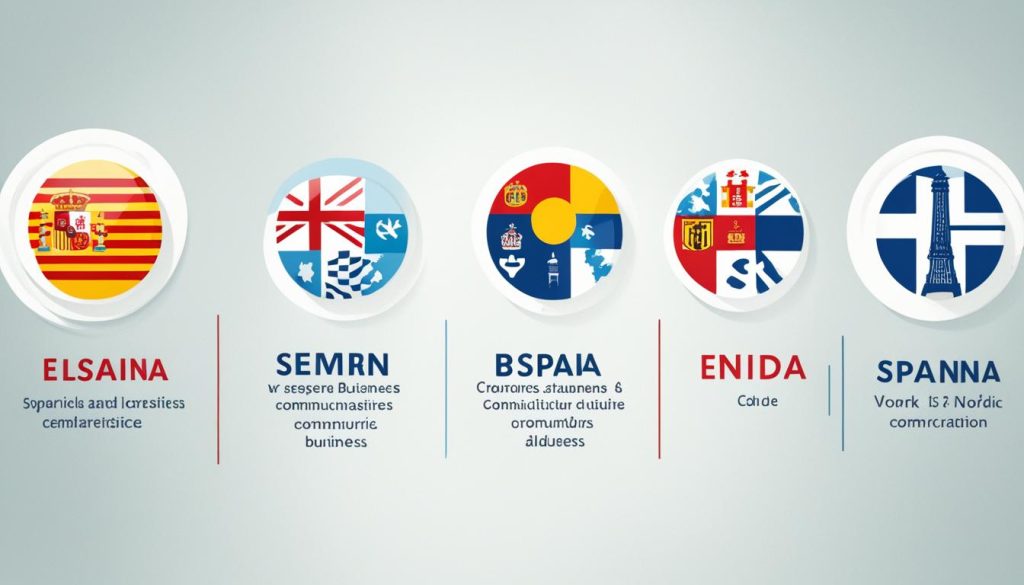In the realm of International Business, it’s crucial to grasp Cultural Differences. The details that define Spain Business Etiquette, Belgium Corporate Culture, and Nordic Business Practices provide a distinct scene. This gives firms an edge when entering new markets. Understanding Cross-Cultural Competency is key to succeed globally today.
Understanding the Business Culture Complexity Index

The Business Culture Complexity Index (BCCI) closely maps out the complexities of global trade. It offers crucial insights into different countries’ work environments. As firms grow internationally, knowing about cultural differences in business is vital. The BCCI acts as a guide, helping companies move confidently in international markets.
Deciphering Denmark’s Top Position
Denmark leads in the BCCI, showing its excellent business culture. Being named ‘least complex’ comes from high trust levels, advanced development, and a focus on equality. The Danish business landscape reflects national values, promoting trust and clear communication.
Belgium’s Placement and Cultural Nuances
Belgium, with a score of 26,764, stands out in the BCCI for its distinctive spot. It values openness in governance and decision-making. This approach blends complexity with efficiency well. Belgium’s economy benefits from its diverse regions and languages, creating an efficient and varied business sector.
Analysis of Nordic Nations’ Business Easiness
The Nordic regions share a theme of simplicity and clarity in business. Norway, Sweden, and Finland demonstrate this through their strong BCCI rankings. Their business environment signifies more than economic interactions. It shows a culture of trust, happiness, and economic freedom aiding business operations.
The Link between Ease of Doing Business and Economic Freedom

The realms of Ease of Doing Business and Economic Freedom are crucial for an economy’s health and competition level. They are the base for countries to form their business rules and policies. These aim to pull in investments and boost growth. Spain and the Nordic countries show different ways they do this and the market effects they have.
Evaluating Spain’s Business Environment
Spain is in a key spot and has solid infrastructure. It offers lots of market chances. The Spain Market Dynamics show the country’s commitment to better its business ways. This betters the Ease of Doing Business. Spain has made changes to make starting a business easier and to protect investors better. This shows Spain’s dedication to economic changes and opening up more.
- Streamlined administrative procedures for starting a business.
- Enhanced judicial efficiency in resolving insolvency matters.
- Reformed labour laws to boost the employment market.
This shows Spain’s ongoing work to be more entrepreneur-friendly in Europe. Its international Economic Freedom rankings are going up because of these efforts.
Business Accessibility in the Nordic Countries
The Nordic Business Model, seen in Sweden, Denmark, and Norway, relies on being open, trusting, and having a full welfare system. These countries are at the top of global lists for Ease of Doing Business and Economic Freedom. This success shows they have markets that are open and easy to enter.
- High regulatory efficiency and openness to global commerce.
- Strong protection of property rights and investment security.
- Inclusive business policies promoting innovation and entrepreneurship.
The Nordic way is a guide on how to mix a market-led economy with ample social welfare. This balance draws entrepreneurs and investors from everywhere.
Correlation between Internet Usage and Human Development

The link between Internet Penetration and Human Development shows how technology affects our lives. As internet use grows, its impact on aspects like education and health is clear. This shows the power of the internet in shaping society.
Studies show areas with more internet access see real benefits in development. This shows the internet is vital for growth. It opens up new chances for learning and improving skills.
- More internet access means better education through online learning. This leads to higher literacy and more education.
- Better health services online help improve health, especially in hard-to-reach places.
- With more internet, economic chances grow as digital spaces help start businesses and create jobs.
The rise of digital tech is changing our world in big ways. This digital shift is improving how societies function. It’s a quiet yet powerful change.
Sharing info globally has made development more inclusive and wide-reaching. Countries using digital tech every day are leading in education, health, and the economy. These advances show the big impact of tech on society. They highlight why more internet use is key to raising living standards worldwide.
Compare Business and Culture between Spain, Belgium and Nordic Countries

Europe’s business landscape is diverse, reflecting a mix of cultures and commerce. Spain, Belgium, and the Nordic countries show how culture shapes business. They have distinct approaches to business dealings and structure.
Spain’s Business Etiquette and Practices
Spain values personal relationships in business. A strong relationship is key before making deals. Much effort goes into building trust, which is vital in Spanish business circles. Status and hierarchy are also highly regarded, showing respect for structure.
Cultural Differences in Belgian Business
Belgian business is known for its precision and formality. Being multilingual leads to varied business styles between Flanders and Wallonia. Punctuality and setting clear work-life boundaries are central to their work culture.
Nordic Countries’ Approach to Business and Equality
Nordic countries prioritize equality in business. They prefer flat hierarchies and value a progressive work environment. Emphasizing modesty and collective success, they foster a team spirit. Decision-making is based on consensus, ensuring an inclusive workplace.
Impact of Corruption on Business Operations

Understanding how corruption affects business is key to keeping things ethical. If a country is clean or corrupt, it impacts how easy it is to do business internationally. Companies that follow rules by Transparency International enjoy a clearer, more predictable market.
Corruption can hide true business goals, creating mistrust and uncertainty. It leads to poor economic choices. It also drives away customers and partners who prefer honest dealings.
- Evaluating corruption through global indexes helps identify risks and plan against them.
- Companies fighting corruption gain in reputation and get ahead in the global market.
- Many companies now have thorough plans to stick to ethical practices and keep their integrity.
Fighting corruption is essential legally, ethically, and strategically. Creating an ethical business environment is crucial for long-term success and fair global trade.
Religiosity and Its Influence on Business and Culture

The link between religion and business creates unique cultural scenes around the world. In global trade, it’s key to grasp how religion and culture mix. Looking at Spain’s religious impact and the Nordic focus on secularism gives us clues. These clues are about how culture shapes business actions.
Spain’s Deep-Rooted Religious Traditions
In Spain, deep religious roots have crafted a culture rich with customs and morals. This culture seeps into the business world. Companies reflect the society’s values, promoting unity and strong community ties. The religious background helps Spanish firms foster loyalty and a group mindset. This affects how they lead and make deals, favouring a personal touch.
This collective spirit shows how Spain’s religious past influences everyday business relations.
Comparing Nordic Countries’ Secular Business Practices
In contrast, Nordic countries take a secular stance in business, different from Spain’s religious warmth. The Nordics value a secular setting in work, focusing on logic and practical ethics. This doesn’t mean they lack unity. Instead, they value independence, pushing for creativity and rewarding hard work. Their secular view encourages a setting where individual efforts matter more than conforming to group norms.
- Individual merits and objective performance are central to Nordic business assessments.
- Secular business practices in the Nordics support a culture of open-mindedness, clearly reflected in their inclusive workplace policies.
- The pragmatic aspect of Nordic secularism translates into efficient decision-making and streamlined organisational structures.
Looking at Spain’s religious influence versus Nordic secularism shows different core ideas. These ideas influence how businesses operate in each area. By grasping these cultural nuances, international companies can better manage the complexities of global markets.
Analysing Press Freedom and Its Effect on Transparency

The level of Press Freedom colours the business environment of a nation. Countries with high Press Freedom Index scores have independent media. This media acts as the public’s guard and fights corruption.
Free press leads to an environment where Corporate Transparency is expected. For example, media reporting on bad business practices can spark reforms. This leads to more accountable corporations.
- Press Freedom and Corporate Transparency: High Press Freedom Index scores mean better corporate transparency.
- Media Independence as a Check on Power: Independent media stops bad business practices, earning trust from investors and consumers.
- Impact on Global Perceptions: The level of press freedom affects how others view a nation’s business ethics and desirability.
Freedom of the press and corporate operations show a nation’s market health. The Press Freedom Index reflects a nation’s ethical standards. A higher Media Independence level means a more transparent, competitive, and fair market.
The Role of Trust in Business Relationships Across Cultures

In international commerce, trust in business is vital. Cultural differences shape how trust is built and maintained. The way trust works in Spanish networking and in the Nordic business world shows these varying methods.
Building Trust in Spanish Business Interactions
In Spain, making strong business relationships is key to success. Time and effort go into building trust early on. This effort is seen in Spanish networking, where making deep connections comes before business talks. This leads to lasting partnerships and mutual loyalty.
Trust as a Business Cornerstone in the Nordics
In contrast, Nordic business thrives on openness and system trust. This trust makes business easier and more efficient in Nordic countries. It’s a trust that goes beyond people to include institutions. This creates a more flexible and speedy business environment.
- Societal trust leading to transparent business culture
- Efficient business negotiations rooted in mutual confidence
- Agility and dynamism in entrepreneurial endeavours
Success abroad needs understanding local business customs. This is true whether building relationships in Spain or relying on societal trust in Nordic countries.
Happiness as an Indicator of Business Culture Health

Today, the happiness of employees gets a lot of attention. The Happiness Index is key in checking the health of a company’s culture. Looking at Belgium and the Nordic countries, we see how a happy workforce is crucial for a company’s success.
The Role of Worker Satisfaction in Belgium
In Belgium, workplace happiness is not just a goal, but something actively pursued. The Happiness Index shows a strong link between worker contentment in Belgium and business success. Workplaces in Belgium focus heavily on work-life balance, offering flexible hours and generous leave policies.
Pursuit of Happiness within Nordic Work Cultures
The Nordics are known for high living standards and forward-thinking policies. They lead in job satisfaction because they integrate happiness into how they operate. They foster contentment through focusing on personal growth, independence, and balancing work and life.
Belgium and the Nordic countries show the importance of job satisfaction for productivity and involvement. Their approach boosts Happiness Index ratings and serves as an example for global companies. They show how making contentment a main goal benefits everyone.
A Look at Group Orientation in Business Settings
In today’s work places, group dynamics are becoming more important, especially in teams. Moving from focusing on just one person to a group effort changes how success is viewed. It’s all about working together as a team.
- Unified Decision-Making Processes: Everyone’s opinion matters, so decisions are made together, allowing all voices to be heard.
- Interdependence in Project Management: Team members depend on each other, knowing their combined skills lead to success.
- Enhanced Communication: Talking openly and often is key in a team, keeping everyone on the same page.
- Emphasis on Group Rewards: It’s not about one person’s success; the team’s achievements are what matter most.
Leaders in these settings play a supporting role, helping the team and being a part of it. They make sure working together is a key part of the company’s culture. This way, everyone’s effort and teamwork are the foundation of the business.
But, it’s key to remember each team member’s needs to make sure teamwork fits with their growth. Matching individual strengths with the team’s goals needs careful thought. It involves understanding everyone’s unique skills and how they fit together.
- Assessment of Individual Strengths: Using everyone’s best skills helps the team grow stronger together.
- Cultural Sensitivity: Understanding different backgrounds helps build a more inclusive team.
- Conflict Resolution: Finding ways to solve disagreements keeps the team working smoothly.
- Recognition of Individual Effort: Celebrating personal achievements helps keep everyone motivated and loyal.
To wrap up, making teamwork work isn’t just about grouping people together. It’s about creating a place where teamwork is valued. Here, the team’s joint efforts make everything better than just individual work.
Embeddedness: Work Culture and Group Dynamics Examined
The concept of group embeddedness explores how cultural norms shape business behaviours. It looks at how these norms are woven into the business world, affecting the way organisations act as a whole. Spain and the Nordic countries provide clear examples of how different work cultures approach embeddedness.
Spain’s Group-Oriented Business Culture
In Spain, group embeddedness plays a crucial role in work culture, promoting teamwork. The focus is on building strong interpersonal relationships and working together towards common goals. This approach underlines the importance of unity and team dynamics in achieving business success in Spain.
- Consensus-driven decision making is a hallmark of Spanish businesses.
- Maintaining harmonious group relations is often prioritised over individual achievements.
Nordic Countries’ Focus on Individualism and Teamwork
In the Nordic countries, work culture balances individual freedom with teamwork. This unique combination supports less hierarchical environments. It empowers individuals while valuing teamwork and diverse views.
- Autonomy is encouraged, with individual contributions and innovations highly valued.
- Collaborative environments are fostered, ensuring that teamwork thrives alongside personal growth.
To wrap it up, Spain and the Nordic countries clearly show different ways of embedding group dynamics in work culture. Spain leans towards a communal, teamwork-oriented approach. Conversely, the Nordics find a balance between individual freedom and working together.
Comparing Egalitarianism in Corporate Hierarchy
The global economy is changing, bringing new views on Corporate Egalitarianism. This change is reshaping how companies think about leadership and how team members interact. Europe is especially interesting in this regard. It provides a clear look into how Belgian Management Style and Nordic Flat Hierarchies apply egalitarian ideas in business. Both offer unique ways to mix equality with corporate culture, and they’re worth a closer look.
Belgium’s Business Hierarchies
Belgian businesses have a special way of doing things. They respect traditional structures but also value fairness and teamwork. There’s a strong push for everyone to talk and work together. This creates a respectful and inclusive workplace. Belgian employees tend to feel valued, maintaining a balance between formality and equality.
Egalitarianism in Nordic Corporate Cultures
Looking at the Nordic region, we see a bold move towards flat structures in business. This approach reduces the gap between different levels within a company. Nordic businesses are known for letting everyone’s ideas flow freely. This inclusive approach boosts innovation and makes people happier at work. It builds a team spirit that’s beneficial all around.
Combining the principles of Corporate Egalitarianism seen in Belgian Management Style and Nordic Flat Hierarchies reveals where business cultures might be heading. Understanding both is key for businesses aiming for a fair and progressive workplace.
Resources and Support for Internationalising SMEs
Small and medium-sized enterprises (SMEs) aim to grow beyond their local markets. They face many challenges when going global. But today, there’s a lot of help available, especially in Europe, to support them. Projects like Passport to Trade 2.0 give important tips on cultural norms and digital strategies. These aids are helping SMEs in Belgium, Spain, and the Nordics not just enter, but succeed in, international markets.
Opportunities for SMEs in Belgium and Spain
Belgium has systems in place to aid its SMEs in understanding international trade. It focuses on innovation and the entrepreneurial spirit. This creates many chances for SMEs to grow. Spain, too, is full of opportunities for businesses wanting to expand internationally. With its strong economy, it supports new businesses with various incentives. This makes it a great place for SMEs to start their global journey.
Supporting Nordic SMEs in Global Expansion
The Nordics are known for their support systems for SMEs looking to enter global markets. They’re pioneering in innovation, sustainability, and education. These factors help businesses venture abroad. There are many government and private programs to assist SMEs in growing globally. This makes the Nordics a prime location for companies wanting to compete globally.
Advantages of Digital Proficiency in Business Communication
The value of digital literacy in today’s business communication is huge. It helps companies overcome old communication hurdles, bringing new ideas and efficiency.
Using digital tools improves communication flows. It lets businesses easily connect with people all over the world. Thus, being digitally smart gives firms an edge. This edge shows up in many ways:
- Streamlined Communication: Quick and clear chats with email, messaging, and video calls.
- Global Reach: Meeting new markets and varied folks via social media and online ads.
- Enhanced Collaboration: Simple teamwork with online workspaces, cloud storage, and project tools.
- Data-Driven Decision Making: Using live data and analytics for smart choices.
- Crisis Management: Fast responses to problems with instant comms and social monitoring.
Teaching staff about digital literacy helps improve business communication. It builds a strong digital workplace culture. Better technological savvy in corporate areas also means more engaged and productive workers, which is crucial today.
The Significance of Netiquette Across Different Cultures
In today’s global business world, digital communication is key. Netiquette for International Business is crucial when dealing with worldwide partners and customers. It’s more than just good manners; it includes understanding Cross-Cultural Communication. This is vital as we engage in emails, social media, and virtual meetings. Acknowledging and respecting varied communication styles is essential for professional relationships.
To work well across cultures, adapting your approach is necessary. The way you handle your digital conversations is important. It could make or break a business deal. If not done right, you might upset potential clients or colleagues.
- Be mindful of formalities in your emails, considering the varying degrees of formality expected across different cultures.
- Understand the importance of precise and clear language, avoiding slang or idiomatic expressions that may cause confusion.
- Respect time zones by scheduling virtual meetings and sending emails at appropriate hours for international recipients.
- Pay attention to the cultural elements of email signatures, such as the use of titles and professional qualifications, which may convey respect in certain cultural contexts.
Understanding Netiquette for International Business is also key on social media. Being thoughtful and culturally aware helps improve your company’s image globally. The push for good Cross-Cultural Communication strategies is crucial. Businesses must be linguistically and culturally skilled to tackle the challenges of global digital communication.
Conclusion
This exploration sheds light on how Spain, Belgium, and the Nordic countries impact global business strategy and corporate culture. Every nation has its own cultural identity. This identity affects how people interact and how businesses work. It’s essential to understand these differences to build strong cross-cultural relationships.
In Spain, the importance of personal connections influences business. In Belgium, language diversity makes business complex. The Nordic countries focus on equality and trust in their business practices. Understanding these cultural markers helps companies in their international efforts.
As companies grow internationally, understanding international corporate culture is key. It’s the heart of a successful global strategy. This analysis helps businesses grasp cultural subtleties. Thus, they can work better in the global market.







